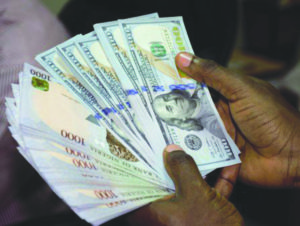 The euphoria that greeted the introduction of the flexible exchange rate regime by the Central Bank of Nigeria (CBN) on June 15, 2016, appears to be fading out even as some stakeholders still applaud it.
The euphoria that greeted the introduction of the flexible exchange rate regime by the Central Bank of Nigeria (CBN) on June 15, 2016, appears to be fading out even as some stakeholders still applaud it.
The Nigeria Economic Society (NES) recently described the flexible exchange rate regime as capable of plunging the country’s economy deeper into recession. NES expressed fear that allowing the market forces to determine value of the naira as envisaged by the new exchange rate regime would generate macroeconomic instability as financial market participants stand to gain through market speculation. According to NES, the development would most likely attract portfolio investment and not genuine investors the country needs to create wealth and employment.
Professor Ben Aigbokhan, president of the NES believes that the flexible foreign exchange rate regime would generate inflationary pressure, reduce the value of financial assets and lead to de-industrialisation of the economy. “The Central Bank of Nigeria (CBN) should review the new foreign exchange regime and opt for some form of managed pegged system consistent with the structure of the Nigerian economy. Managed float policy is a better option given the Nigerian economy’s current local productive capacity and over-dependence on crude oil as major source of foreign exchange earnings with its price determined exogenously driven in the global market,” he said.
He advised the CBN to re-focus the emphasis from managing the naira to managing the economy as a robust economy will sufficiently cater for the naira and use full employment strategy to fight inflation. He also urged the CBN to intervene in areas that would enhance local production (development mandate) particularly, the SMEs, and the manufacturing sector, adding that the Bureau de Change (BDCs) should not be permitted to recapture the exchange market as it will defeat the policy objective and CBN should also buy from the market to stabilise the exchange rate when need arises.

Dr Mahmud Fashola, former head of the Department of Economics, University of Lagos, also stated that the flexible exchange rate regime would leave Nigerians poorer. He recommended pegged exchange rate for the economy. “The best system for a developing economy is fixed exchange regime. The idea of having flexible foreign exchange regime is to destroy the economy. The so-called market forces are not market forces. It is ‘corruption forces.’ When we talk market forces in classical economics, we are talking of competitive market forces by those who are producing and not those who are unproductive,” Fashola said.
Similarly, the Manufacturers Association of Nigeria (MAN) claimed that its members lost over N300 billion as a result of the foreign exchange stance of the CBN. Mrs Stella Okoli, vice president of MAN, explained that the N300 billion was lost because manufacturers who bought a dollar last year at between N170 and N200 are now technically buying it at N350. Okoli, who is also the Chief Executive Officer, Emzor Pharmaceuticals, said that those that placed orders for raw materials at the old exchange rate of N200 to the dollar but could not pay for them because of their inability to have access to foreign exchange at the time, are now worse off as they must redeem the payment and commitment to their suppliers at a higher cost given the current rate.
“So, we have lost and people have scaled down operation while some others have closed shop. We lost through forex; interest rate and manpower, though it causes us so much to produce, we cannot pass on the extra cost to consumers because they will complain,” she said.
Investigation by TheEconomy showed that even exporters who are supposed to benefit from the current foreign exchange regime are perturbed. Their worry is due to the fact that the current regime is not free enough to grant them access and utilisation of the foreign exchange proceeds of their exports. They perceived that their foreign earnings are trapped in a captive market at a rate determined by the interbank market. They preferred to be allowed to sell their export earnings at the parallel market where they would have higher income.
Nevertheless, some stakeholders still see the introduction of flexible exchange regime as a step in the right direction. For instance, Muda Yusuf, director-general, Lagos Chamber of Commerce and Industry, said that the new regime is achieving its objectives, which include enhanced liquidity and transparency in the foreign exchange market. According to him, it is now easier to access forex than what it was before the re-introduction of the flexible exchange regime. “When I talk of liquidity, I mean the ease with which one can sell and buy foreign exchange. It is easier now for businesses to plan than what we had during the fixed exchange rate regime,” Yusuf said.
The Chief Executive Officer, Financial Derivatives Company Limited, Mr Bismarck Rewane, also lauded exchange rate policy, saying it would eliminate the fears by foreign investors about the Nigerian forex policy.
By Dike Onwuamaeze

